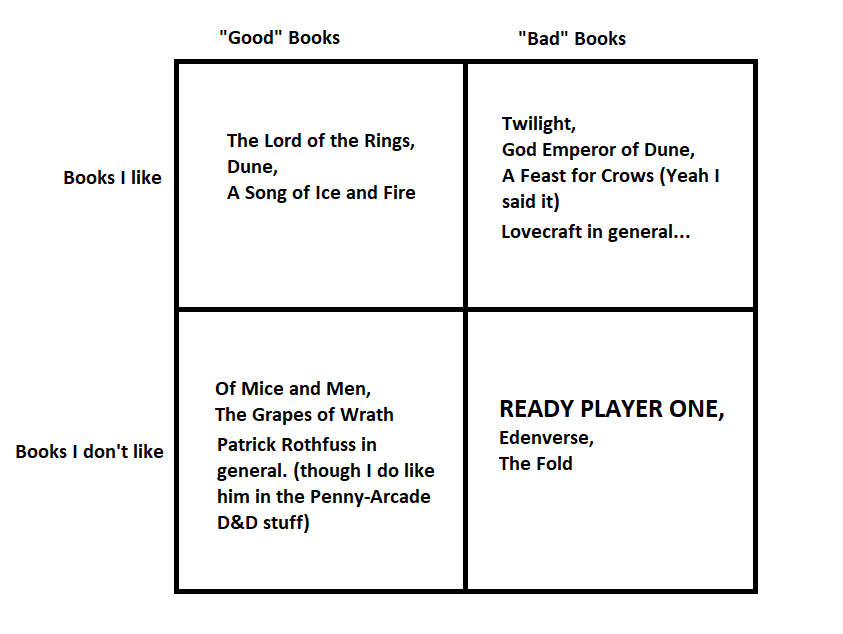Ben’s Book Review Philosophy
Goodreads and 5-star Ratings
First, let’s talk about the “Goodreads problem.” Goodreads is a troubled site that most of its active user base hates. The technology and design of the site are outdated. There are numerous bots and hacked accounts that go around liking posts in an effort to get you to click on their shady, shortened urls. In a world where booktube, bookstagram, and booktwitter are all flourishing, Goodreads has remained relevant largely because it still has the best databases (we can probably thank it’s owner, Amazon, for that) and because it has inertia on its side. There are many alternative solutions popping up, but it will take time for any of them to pull a significant chunk of the userbase away. For the time being, there is one central community where most book enthusiasts go to document and review their reading. So let’s talk about the problems with Goodreads.
One of the most often cited problems with Goodreads is its simple 5-star rating system. The argument goes that the 5-star rating system does not allow for enough nuance. I agree. As someone who loves both great literature and the later Dune books, I’m often conflicted on whether I should rate a book based on its quality or how much fun I had reading it.

A core component of my review philosophy is that we should first make a distinction between how much we “like” a book, and how much skill its author demonstrated in crafting the book. This isn’t a distinction that Goodreads, or any Amazon system, encourages it’s users to make. We’ve said many times on Words About Books that it is absolutely fine to like whatever, but it is important to acknowledge flaws even in a book you personally enjoy.
I have read H.P. Lovecraft more than I have read any of the other important authors of the American canon. I enjoy stories about space monsters more than I enjoy stories about The Great Depression. Does this mean that At the Mountains of Madness is a “better” story than The Grapes of Wrath? Good lord, no.
How should I rate books that I enjoy but find lacking in substance compared with books that I find to be well-written but miserable? In recent years, I’ve started erring on the side of craftsmanship. I tend to rate books that display relatively weak writing skill lower than books that display great skill. I then write reviews, usually several paragraphs long, attempting to explain my rating. I doubt most people ever read them. By far, the most prominent metric of a book’s quality is its “average rating.”
Ultimately, my review philosophy is one that favors good writing over an enjoyable reading experience. This results in a lower rating for books that are probably much more accessible and enjoyable to casual readers. There is a drawback to this approach, though, as it also tends to foster…
Elitism and Confusion

At some point on Words About Books, we are going to do an entire episode on elitism in book communities. There are a few different flavors of elitism, but the one I want to talk about today is the more “academic” elitist. In my experience, it is the fans of YA (Young Adult) fiction that get the brunt of the abuse from this type of elitist.
In the past, this sort of elitist looked with disdain on all “genre fiction.” Today though, there are a number of “Tolkien Scholars” and Phd’s in “Speculative Fiction (Sci-fi).” I think the genre fans have finally received the legitimacy they craved. This enabled the fans of elves and aliens who look and act like elves, to join the academics in turning on the YA community. You know, because it’s for kids or something. Unlike the elves, which are the province of men.

It may not seem like it if you’ve ever heard me discuss my own work, but I actually do enjoy writing. For most of my life I did not read much outside of my comfort zone. I stuck primarily to the genres and authors that I knew I would like. My own writing was hamstrung as a result. I strongly believe that having a diverse reading background, in every sense of the term, is critical to being the best writer you can be.
I’ve said this before many times, but for any new listeners/readers, one of the main reasons that this podcast was started was that we wanted to have an excuse to read more and different kinds of books. It’s also for this reason that I tend to reward good writing over an enjoyable reading experience in my review philosophy. I’m here, in large part, for the writing.
With all that said, I want to be clear that I do not think this is the “correct” preference. I do not think that there is a “correct” review philosophy. This is where Goodreads’s failure to modernize its website and recommendation algorithms becomes a problem.
A lot of the frustration in the book community can be traced back to misaligned expectations. There are people, like me, who are rating and reviewing books with an eye toward writing quality. There are other people who rate and review based only on whether or not they liked the book. They’re not interested in assessing writing quality. They are interested only in enjoying the time they spend reading. These are both totally valid ways of thinking about the books we read. The problem is that the systems we use aren’t distinguishing between different types of reviewers. Goodreads takes people who are grading a work using entirely different rubrics and just averages their scores together.
This creates a world where Beowulf averages 3.5-stars and The Hunger Games averages 4.32-stars. These two books can’t be properly compared in this way. The star ratings and written reviews on Goodreads are only valuable relative to other books that users must implicitly understand are related. Often, though, we don’t understand that The Hunger Games averages 5-stars because most reviewers are only comparing it to other young adult novels. Instead, we see Hunger Games topping ranked lists, and we wonder how someone could think that it’s better than all of the classics that wound up lower on the list.
The Three Why’s

The best tool we have for mitigating the confusion and elitism is to include solid written reviews in addition to whatever rating we leave. It’s no substitute for a better overall rating system, but for now it’s what we have to work with.
Regular readers of the blog will know that I am constantly trying to figure out exactly what it is I was thinking whenever I recorded the podcast. I don’t know if anyone would agree that my critiques are particularly insightful, but I do try to mix some substance in with the stupid jokes and audio gags. There is one trick I’ve found especially helpful when it comes to mindfulness.
I don’t remember where I first got this advice, and I tried googling to see if it was attributed to anyone specifically, but it seems like any number of self-appointed gurus have taken credit for the technique and I lost interest.
Essentially the technique is to identify a feeling, thought, bias, position, etc.. that you have and then to ask yourself why you think/feel that. You then ask why again, and again one more time. Let’s take an example from the actual podcast.
Feeling: I liked the short story “The Art of Negotiating with Space Monsters” by Jay Key.
- Why did you like it?
- The main character was very relatable.
- Why did you find him relatable?
- He was emotionally vulnerable. We saw him at an emotional low point. He powered through that and overcame the challenge. It was very satisfying.
- Why is it important that a character show vulnerability in order to be emotionally relatable?
- Because it gives me an entry point into the characters head. I’m emotionally vulnerable, though it’s a side I don’t like to show to anyone I don’t trust. I associate sharing vulnerability with trust and the people I care about.
The insights produced by this exercise may seem a bit obvious, and the exercise itself may seem a bit tedious. It’s not always necessary. Sometimes I know exactly what I’m feeling and why. If we’re all being honest with ourselves, though, there are a lot of reactions, feelings, and biases we have that go unexamined. With a combination of mindfulness to detect these habitual reactions, and determined analysis of their origins, we can learn a lot about ourselves.
By being consistent, and explaining why you feel a certain way about a book, you can…for lack of a better phrase…”build a brand.” This gets us around the problem of reviews being relative. The more of yourself you can put into your writing, even book reviews, the more people can contextualize it. The review will be both more useful, and more enjoyable to read. This is the heart and soul of “Ben’s Book Review Philosophy.”
Some Alternatives to Goodreads
That last section was probably the best place to end, but since I talked specifically about Goodreads a little more than I’d originally intended, I thought it might be good to close out with a list of potential alternatives to Goodreads.
StoryGraph – StoryGraph tries to improve on the Goodreads recommendations by allowing users to place books into a variety of specific categories. This goes deeper than genre. For example, a book may be marked as “Fiction, Fantasy, Young Adult” and it may feel “adventerous, dark, slow-paced.” They also have some more interesting reading challenges. It still seems like things are a bit of a work in progress, though. The site is very bare bones.
Readerly – Readerly is an app that is still in beta. I, unfortunately, haven’t done as much with this one yet. It’s mobile-only at the moment, which is kind of a deal-breaker for me. I like my long-winded reviews, and I need a keyboard and a large screen to accommodate them. From what I have seen on the phone app, though, it seems like a strong contender for mobile users of Goodreads. In terms of features, I definitely preferred it to Goodreads. Just need a web app.
There are others out there like Booksloth, Libib, Riffle, etc.. I haven’t done much with them though. If you do check them out, let me know how they are.